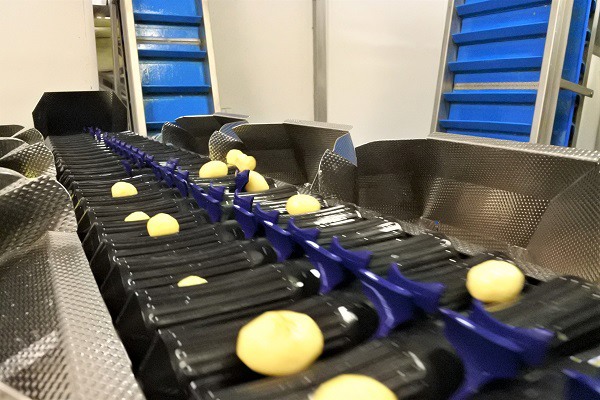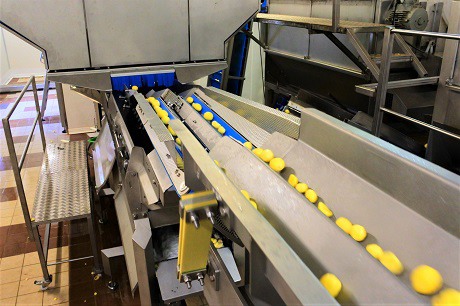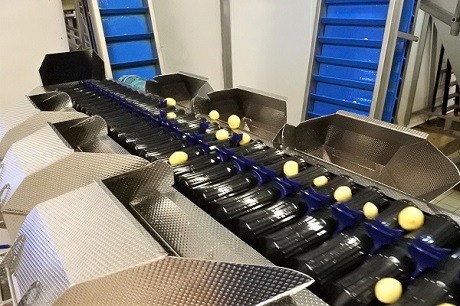Many optical sorting machines work by discarding subpar material or foreign matter from a batch of potatoes. But some sorters check products’ quality. “It’s a matter of good, bad, or repeel,” says Sjors Vullings of Marcelissen. “We've had a sorter on the market for almost a year. It can, however, do so much more than merely checking if something can stay on the line or not. It can sort potatoes using various customized criteria. These machines can, for instance, sort baby potatoes, regular potatoes, and French fry potatoes all on the same line. These product groups can then each be sent directly to the correct processing line.”

sorting works with rubber fingers
One of this Dutch company’s clients has one of these SO(M)-II optical sorters with seven exits. “That client sorts his washed, peeled potatoes into five different categories. He has two exits for byproducts too. The washed, peeled potatoes go into the machine and reach a conveyor belt that works with sliders. When the potatoes pass the correct exit, the slider receives a signal."
"The potato is then, literally, pushed off the conveyor belt. That’s more product-friendly than flippers. It’s also less complicated than sorting machines that use compressed air. The number of exits are interchangeable too. Our company can also add the necessary follow-up product lines, like potato halving or quartering machines. This machine doesn’t only offer more exits," explains Sjors.
"It also checks the potatoes down to the square millimeter for defect and color. That’s very precise. We pay a lot of attention to the proper handling of byproducts that are filtered out. That’s because we believe these residual streams can have added value for the companies. Our ideas fit in with this image of sustainability and using the entire potato. Our peeling machines can get even higher yields from the peeled potatoes.”

entry of potatoes into the optical sorter
Marcelissen’s optical sorters aren’t suited to only sorting washed, peeled potatoes. "We’re currently busy adapting the machine so it can sort unpeeled potatoes, or even peeled and unpeeled ones at the same time," says Sjors. "However, this machine isn't intended to be used to filter out foreign matter. We remove this from the product flow earlier in the process before the potatoes are scrapped or peeled."
"Foreign matter can damage these scrapping and peeling machines. If a pebble or twig does make it through, it will be rejected, based on its color. It will, therefore, end up in the residual stream. But that rarely happens, and the machine isn’t designed for this either. This machine focuses on the comprehensive 360-degree inspection, grading, and sorting of whole potatoes.”
The company is well-pleased with how it's endured the corona crisis so far. “Intake orders didn’t decline, but we did see a drop in new machine orders. In the first months of the crisis, we were sometimes faced with challenges around service and maintenance on location at clients," admits Vullings.

multiple sorts are possible with the SOM
"That was due to all the measures and travel restrictions in the various countries. However, since we support a vital sector, things always turned out well. But, we did see some clients debating on whether to purchase a new machine or not. They do save on labor, but it’s a major investment for a company in, undoubtedly, uncertain times.”
“We wanted to accommodate our clients in these difficult times. So, where possible, we gave them the option to rent the desired machine for a few months first. Or we, for example, extended their loan period. It was, therefore, possible for clients to pay the machine off in smaller increments. You have to get through these extraordinary times together,” says Sjors.
More information
Sjors Vullings
[email protected]
 Marcelissen
Marcelissen
Blauwwater 14
5951 DB Venlo
T +31 (0) 77 475 2002
F +31 (0) 77 475 1990
[email protected]
www.marcelissen.nl










